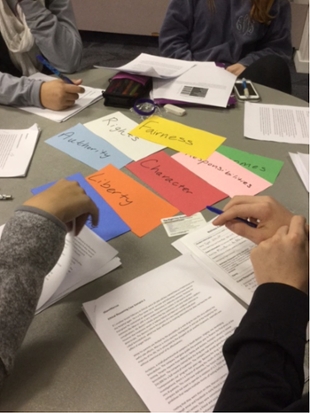Facilitating student involvement: Faculty use Eight Key Question ethical reasoning to structure course experiences
Office of the ProvostBy Elizabeth R. H. Sanchez ('15M)
In the beginning of the fall 2016 semester, Daisy Breneman’s disability and justice course at James Madison University used Eight Key Questions (8KQ), a framework for ethical reasoning, to establish classroom guidelines. As discussions of character, fairness, outcomes, rights, responsibilities, empathy, authority, and liberty grew, student dialogue began to structure the course.

“We talked about the role of responsibility – that getting the most out of class, and helping others do the same, is one responsibility of being a JMU student,” Breneman mentioned, “we discussed that it would be important for everyone to come prepared, out of fairness to others who prepared,” and continued, “calling on empathy,” students in the class “agreed to be patient with each other throughout the learning process.”
Indeed, introducing the Eight Key Questions in the classroom, as well as in justice studies material, changed the dynamic of Breneman’s course – she noted a significant increase in student involvement, particularly in the realm of individual contributions. “By exploring the ethical decisions at the heart of classroom behavior,” Breneman stated, the 8KQ “served as a framework for the entire class to think about their participation in the course in new ways...students are reading; we’re having rich discussions; we have fewer to no distracting or disruptive behaviors; [students are] respectful to me, each other, and guest speakers; they are honest and thoughtful. In short, it has made us a strong, productive community.”
Breneman’s experiences do not stand alone. Faculty and staff from a host of different academic disciplines and student affairs programs note the transformative power of discussing the 8KQ. Bill Hawk, Chair of The Madison Collaborative: Ethical Reasoning in Action, the office responsible for fostering Eight Key Question education, encourages all interested faculty to “discover the unexpected benefits of nurturing an ethical reasoning learning community,” as Breneman did in her disability and justice course. “Her students engaged deeply in the learning process and transformed the classroom atmosphere for the entire semester,” said Hawk, “Eight Key Question ethical reasoning can structure a serious learning climate in addition to guiding moral decision making.”
Perhaps most importantly, students enrolled in 8KQ-infused courses appreciate being able to discuss important issues that arise in their academic and personal lives. In the final reflections for the disability and justice course, Breneman noted that all students “praised the classroom environment, and talked about ways they will apply the 8KQs to communities beyond the classroom.” As JMU student Heather Roell (’20) mentioned, Eight Key Question ethical reasoning “can help anyone in any major.” Roell’s PHIL 150: Ethical Reasoning classmate, Kelsey Reed (’20) shared, “I appreciate the Eight Key Questions because it is a unique way, special to JMU, that allows us to solve ethical problems as a community.” Joshua Bounds (’20) echoed others’ words by saying, “ethical reasoning really challenges me in ways I never thought was possible, it really makes me work to find a conclusion, and I enjoy it.”
Faculty interested in discussing ethical considerations with students can do so by adapting the 8KQ framework to facilitate conversation, set expectations, structure a learning environment, and teach subject material. As Breneman mentions, "The Madison Collaborative [provides] not only the 8KQ framework, but opportunities to explore ways to thoughtfully incorporate it... with others in the campus community." For more information, visit the Madison Collaborative’s website or email the Madison Collaborative: mc@jmu.edu.

